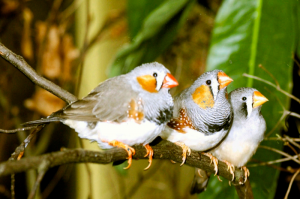WEDNESDAY, 28 APRIL 2010
Zebra finches are brightly patterned birds fAustralia that exhibit intriguing behaviour when it comes to raising their young. Some females of the group lay eggs in other female's nests. She tries to deceive the host into incubating and raising the chick as her own. This is called brood parasitism, the most famous example of which is the cuckoo, which does not build a nest but parasitises another species exclusively.Schielzeth and Bolund, who carried out this research, used a complex set-up involving 139 finches and 1732 eggs [1]. As the host and parasite are the same species in this case, genetic analysis was required to tease out the parentage of each egg, a tool not available for observations in the wild.
While zebra finches do make their own nests and lay eggs in them, the researchers found that one in five clutches have a parasitic egg, one out of every six eggs is a potential parasitic egg and two out of five such parasitic eggs are successful, in that the host incubates the egg without rejecting them.
The timing of laying the parasitic egg seems to be crucial to its success. Too early and the hosts are likely to abandon it, too late and the hosts are already incubating their own clutch and it will be difficult to sneak another one in. The gregarious nature of zebra finches means that they are able to monitor what other nesting pairs are doing and time their parasitic attempts accordingly.
Written by Wing Ying Chow

